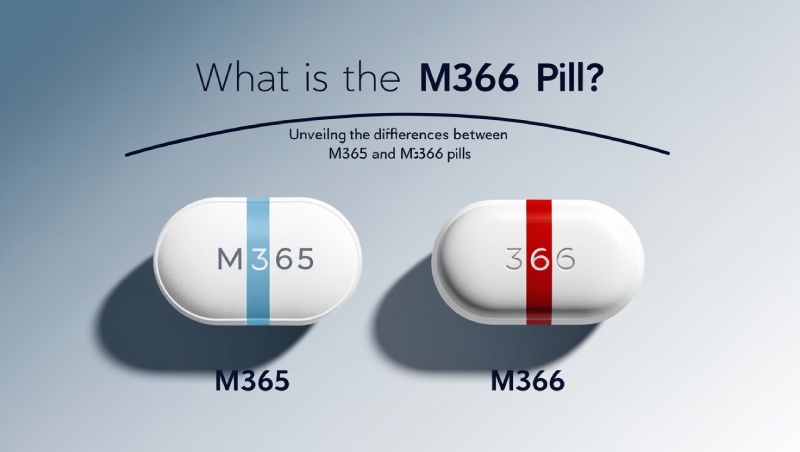Health
What is the M366 Pill? Unveiling the Differences Between M365 and M366 Pills

Introduction: Decoding the Mystery of M365 and M366
With countless pills available, it can be confusing to identify the right ones. The M365 and M366 white pills often come up in discussions around medication. Understanding these pills is crucial for anyone who uses them.
The Allure of Medication Identification
Medication identification plays a vital role in ensuring proper treatment. Knowing what each pill does helps prevent errors and promotes safe use. Misidentifying a pill can lead to serious consequences.
The Importance of Accurate Information
Accurate information is essential for health management. Having precise knowledge about medications aids patients in making informed decisions. Whether you’re a patient or a caregiver, knowing the facts helps keep everyone safe.
Navigating the World of Similar Medications
With so many medications that look alike, it’s easy to mix them up. The M365 and M366 pills are prime examples. They may seem similar at first glance, but their uses and effects differ significantly.
Understanding the M365 Pill: Composition and Uses
Active Ingredients and Their Functions
The M365 pill is a round, white tablet that primarily contains Acetaminophen (325 mg) and Diphenhydramine HCl (12.5 mg). Acetaminophen is a pain reliever and a fever reducer, while Diphenhydramine is an antihistamine that helps relieve allergy symptoms.
Common Medical Conditions Treated
Doctors often prescribe the M365 pill for:
- Common colds and allergies
- Mild to moderate pain relief
- Insomnia
Potential Side Effects and Precautions
Patients should be aware of potential side effects, including:
- Drowsiness
- Dizziness
- Dry mouth
Always consult with a healthcare professional before using this medication, especially if you have existing health conditions.
Unveiling the M366 Pill: Composition and Uses
Key Differences in Formulation
The M366 pill, on the other hand, contains Ibuprofen (200 mg). This nonsteroidal anti-inflammatory drug (NSAID) is different from the M365’s components. Ibuprofen helps reduce inflammation, pain, and fever.
Therapeutic Applications and Patient Profiles
M366 is typically used for:
- Arthritis pain management
- Muscle pain relief
- Menstrual cramps
Those experiencing inflammation or chronic pain may benefit more from M366 compared to M365.
Contraindications and Drug Interactions
Using M366 may not be suitable for everyone. People with certain conditions, like kidney disease or stomach ulcers, should avoid it. Always review potential drug interactions with a physician.
Comparing M365 and M366: A Side-by-Side Analysis
Similarities and Differences in Active Ingredients
While both pills aim to relieve pain, their active ingredients differ significantly:
- M365: Acetaminophen and Diphenhydramine
- M366: Ibuprofen
Comparative Analysis of Therapeutic Effects
- M365: Works well for allergies, mild pain, and sleep disturbances.
- M366: More effective for inflammation and chronic pain.
Side Effect Profiles: A Comparative Overview
Both pills present side effects, yet they differ. M365 may cause drowsiness, while M366 can lead to stomach upset. Understanding these differences is vital for optimal use.
Real-World Examples and Case Studies
Case Study 1: Illustrating the Appropriate Use of M365
Sarah, a 32-year-old teacher, struggled with allergies during spring. Using M365 helped her manage symptoms and allowed her to focus on her students.
Case Study 2: Highlighting the Specific Use of M366
Mike, a 45-year-old runner, experienced joint pain. He turned to M366, finding significant relief during his recovery, which allowed him to resume training sooner.
Data Points: Prevalence and Treatment Success Rates
Research shows that both medications have high patient satisfaction rates. In a survey, 78% of users reported effective pain relief with M365, while 82% found M366 beneficial for inflammation.
Expert Insights and Recommendations
Doctor’s Perspective on Choosing Between M365 and M366
Doctors recommend evaluating symptoms carefully before selecting a medication. Understanding the exact nature of your discomfort can guide you to the right pill.
Pharmacist’s Guidance on Medication Safety and Efficacy
Pharmacists emphasize reading labels and understanding side effects. They can provide personalized advice based on your health history.
Patient Testimonials and Experiences
Many patients have noted the effectiveness of each medication in treating their specific conditions. User feedback can often help others make educated choices.
Conclusion: Making Informed Decisions About Your Medication
Key Differences Summarized
- M365 is better for cold symptoms and sleep issues.
- M366 excels in pain and inflammation management.
The Importance of Consulting Healthcare Professionals
Consulting with a healthcare provider ensures that you receive the most effective treatment tailored to your needs. They can clarify any doubts regarding these medications.
Tips for Safe Medication Management
- Always read labels carefully.
- Keep track of your symptoms and medication responses.
- Never mix medications without consulting a doctor.
Understanding these pills and their differences will help you make informed health choices. Being knowledgeable leads to better health outcomes.
Health
Personal Development: Why Self-Reflection is So Important for Progress

When it comes to personal development, the benefits of self-reflection are many. Some people might consider introspective soul-searching to be somewhat self-indulgent, or even narcissistic, but the truth is that self-reflection is necessary if we want to grow. Awareness of self allows us to develop better relationships with others, increases our confidence in ourselves, and even enables us to better manage our emotions.
Unsure where to start on your road to self-reflection? For young people, experts like those who have studied an online Masters in School Counseling can be valuable resources for working on self-reflection skills.
Stay with us as we outline some of the benefits of self-reflection, and explore how they relate to personal growth.
Better relationships
If we’re looking for reasons why self-reflection should be a priority, one of the most important is that enhancing our self-awareness allows us to build stronger relationships with others.
As a result of developing a better understanding of oneself, we can learn to better understand the people around us. This is key, as our ability to understand and empathize with others is at its core, one of the fundamental building blocks of relationship building. After all, how can we relate to other people if we do not have genuine empathy or understanding toward them?
Empathy for others also stems from having empathy for ourselves. Seeing ourselves and other people with compassion is, for some of us, a skill that needs to be cultivated. For many, it comes naturally to be hard on ourselves, and at times, to extend this harshness to other people. Self-reflection allows us the opportunity to acknowledge when we have done things well, as well as offer ourselves empathy for moments we could have done better. We can then also learn to apply these insights when assessing other peoples’ actions or decisions.
The benefits of self-reflection in terms of building positive relationships don’t just end there, though. If we want to develop rewarding, meaningful relationships with others – bonds where both parties deeply understand each other and what they bring to the table – we also need to be self-aware: of own own value, as well as what we deserve from others. Self-awareness is key to setting healthy boundaries with others, and our expectations around the ways we want other people to treat us. If our goal is to build balanced relationships that are as nurturing as they are meaningful, self-reflection is essential.
Improved stress management skills
Self-reflection also enables us to better manage our own emotions – including stress. How? When reflecting on times of stress and evaluating what we did well – and what could use some work – we can use these insights to handle future situations better.
Having a deep awareness and understanding of ourselves also helps us understand our emotional triggers – the things that send us spiraling into negative spaces. Once identified, triggers can be avoided – or, if that’s not possible, coping mechanisms can be developed to deal with our reactions to these triggers.
For sufferers of anxiety, for instance, it may not always be possible to remove oneself from overstimulating situations. Battling an overcrowded, fluorescently-lit grocery store at peak hour can be a daunting experience for the most seasoned shopper, for example, but when we have anxiety, it can be a nightmare. Having self-awareness that this particular scenario is triggering for us can help us through it. We might choose to shop at our own pace, streaming calming beats through our noise-canceling headphones. Or, we could focus on the parts of the shop we enjoy – like selecting our favorite candy bars.
Either way, being self-aware of our triggers and our reactions to them can help us better manage our stress, and make it easier for us to cope with overwhelming situations and emotions.
Increased confidence
Finally, having self-awareness of what we do well, celebrating our wins, and reflecting on our accomplishments can help increase our confidence. In a world where tall poppy syndrome is almost the default – there’s no shame in applauding ourselves when we’ve done something right.
Actually, it’s necessary – our self-esteem and sense of self-worth depend on our ability to recognize our value and the amazing things we can achieve.
~
As discussed today, self-reflection is integral to self-development and progress.
By having a deep awareness of our value as individuals, we can improve our confidence and sense of self-worth. Our relationships with other people become more meaningful, nurturing, and rewarding when we understand ourselves, too. Just as importantly, self-awareness can help us identify and understand our triggers, helping us better manage our emotions.
Health
Finding Freedom from Addiction: A Journey Toward Lasting Recovery

Addiction is a profound and complex struggle that affects millions of individuals worldwide. It can entangle the mind and body, creating a sense of captivity that feels insurmountable. However, the path to recovery—to true freedom from addiction—is not only possible but also transformative. By understanding the nature of addiction, recognizing the need for help, and committing to a structured recovery journey, individuals can break free and reclaim their lives.
Understanding Addiction
Addiction is not merely a lack of willpower or a moral failing; it is a chronic condition characterized by compulsive behaviors despite adverse consequences. Whether the addiction involves substances such as alcohol, drugs, or behaviors like gambling or overeating, it stems from changes in the brain’s reward system. These changes create a dependency that can dominate thoughts, emotions, and actions.
Recognizing the multifaceted nature of addiction is the first step toward recovery. Addiction often coexists with mental health conditions such as anxiety, depression, or trauma, further complicating the struggle. This connection highlights the importance of addressing both the physical and psychological aspects of addiction during recovery.
Acknowledging the Need for Help
Breaking free from addiction begins with a crucial realization: the need for help. Denial often prevents individuals from seeking support, but acknowledging the problem is an empowering act of self-awareness. Accepting help is not a sign of weakness but rather a courageous step toward transformation.
Support can come from various sources, including family, friends, support groups, and professional treatment centers. Each plays a vital role in creating a network of encouragement and accountability, which is essential for lasting recovery.
The Path to Freedom
Recovery is a journey, not a destination. It requires time, commitment, and perseverance. Here are the key stages in the journey toward lasting recovery:
1. Detoxification and Withdrawal
The first phase of recovery often involves detoxification, a process where the body eliminates harmful substances. This phase can be physically and emotionally challenging, as withdrawal symptoms may arise. Medical supervision during detox ensures safety and comfort, making it a critical step in the recovery process.
2. Rehabilitation and Therapy
Rehabilitation is where the real transformation begins. Structured programs—inpatient or outpatient—provide a supportive environment for individuals to address the root causes of their addiction. Therapy plays a pivotal role in this stage:
- Individual Therapy: Cognitive-behavioral therapy (CBT) and dialectical behavior therapy (DBT) help individuals identify triggers, develop coping mechanisms, and reframe negative thought patterns.
- Group Therapy: Sharing experiences with peers fosters a sense of community and reduces feelings of isolation.
- Family Therapy: Addiction affects loved ones too. Family therapy mends relationships and strengthens support systems.
3. Building New Habits and Lifestyles
Recovery is about replacing harmful habits with positive ones. Building a healthy lifestyle involves:
- Physical Wellness: Regular exercise, balanced nutrition, and sufficient sleep restore the body’s vitality.
- Mental and Emotional Health: Mindfulness practices, meditation, and hobbies enhance overall well-being.
- Skill Development: Learning new skills or pursuing education provides a sense of purpose and achievement.
4. Aftercare and Relapse Prevention
Recovery doesn’t end after rehabilitation. Aftercare programs, such as sober living homes, ongoing therapy, and support groups, provide a safety net for individuals transitioning back into daily life. Relapse prevention strategies, including identifying warning signs and creating an action plan, empower individuals to maintain their sobriety.
The Role of Professional Treatment Centers
Professional treatment centers play a pivotal role in recovery by offering evidence-based approaches tailored to individual needs. These centers provide a holistic framework, addressing not only the addiction but also underlying mental health issues. With trained professionals and a structured environment, treatment centers create a foundation for lasting change.
Key services offered by treatment centers include:
- Comprehensive assessments to identify the extent of addiction and co-occurring disorders.
- Personalized treatment plans that consider the individual’s unique circumstances.
- Access to medical care, therapy, and support groups.
- Holistic therapies, such as art therapy, yoga, and nature-based programs, that promote healing.
Overcoming Stigma
One of the biggest barriers to seeking help is the stigma surrounding addiction. Society often views addiction as a moral failing rather than a health condition, creating shame and isolation for those struggling. Breaking free from addiction requires challenging this stigma and fostering a culture of understanding and compassion.
Education and open conversations about addiction can shift perceptions, encouraging individuals to seek help without fear of judgment. Support from loved ones and advocacy for mental health awareness also play a critical role in dismantling stigma.
The Power of Community in Recovery
Community support is a cornerstone of lasting recovery. Being surrounded by individuals who understand the challenges of addiction and share the same goal of sobriety fosters a sense of belonging and accountability. Peer support groups, such as Alcoholics Anonymous (AA) or Narcotics Anonymous (NA), offer a platform for sharing experiences and gaining insights from others who have walked the same path.
Beyond formal support groups, community involvement through volunteer work, mentorship, or participation in local events can enhance a sense of purpose. Building a network of positive influences helps replace the environments and relationships that may have contributed to addiction.
Personal Growth and Transformation
Recovery is not just about overcoming addiction; it’s an opportunity for personal growth and transformation. The journey often inspires individuals to rediscover their passions, set meaningful goals, and embrace a more fulfilling life. Many people in recovery find strength in helping others, becoming advocates for addiction awareness and mental health support.
Exploring creative outlets like art, music, or writing can also play a significant role in the healing process. These activities offer a way to express emotions, cope with stress, and build self-esteem.
Embracing a Holistic Approach
A holistic approach to recovery considers the interconnectedness of the mind, body, and spirit. Practices such as yoga, meditation, and mindfulness help individuals develop a deeper connection with themselves and cultivate inner peace. Additionally, incorporating nutrition education and physical activity into recovery plans supports overall well-being.
Holistic therapies, such as equine therapy, wilderness therapy, or acupuncture, can complement traditional treatment methods. These practices encourage individuals to explore new perspectives, build resilience, and develop a sense of balance in their lives.
A Call to Action: Take the First Step
The journey to freedom from addiction begins with a single step: reaching out for help. Whether it’s confiding in a trusted friend, joining a support group, or contacting a treatment center, taking that step signifies hope and determination.
Recovery is not just about abstaining from addictive behaviors; it’s about rediscovering life’s joys, rebuilding relationships, and achieving personal growth. It’s about finding freedom—freedom to live authentically, pursue dreams, and embrace the future with optimism.
Conclusion
Addiction may feel like a cage, but recovery holds the key to liberation. By understanding addiction, seeking help, and committing to the recovery process, individuals can break free from its grip. With the support of professional treatment, a strong network of allies, and an unwavering belief in their potential, anyone can embark on the journey toward lasting recovery. Freedom is not just a destination; it’s a journey of transformation, resilience, and hope.
Recovery is a testament to the strength of the human spirit and the power of change. By embracing this journey, individuals can find not only freedom from addiction but also a renewed sense of purpose and fulfillment. Every step taken is a step closer to a brighter, healthier, and more meaningful life.
Health
Top 4 Benefits of Exceptional Home Care for Seniors

Did you know most seniors want to stay in their homes? Aging in place brings comfort but also comes with challenges. Many older adults face tasks that become harder with time.
How can they stay independent while living safely and happily? Exceptional home care offers the perfect solution. It provides personalized support to help seniors manage daily activities.
Home care for seniors improves their comfort, safety, and overall well-being. With the right help, seniors can enjoy life in familiar surroundings. Let’s explore four amazing benefits of choosing exceptional home care for seniors!
1. Personalized Care Tailored to Individual Needs
One of the most significant advantages of exceptional home care is that it provides personalized support. Caregivers work with families to develop a care plan that addresses the specific needs and preferences of the senior. This means that care is not one-size-fits-all; instead, it is customized to include:
- help with bathing, dressing, and grooming
- medication management and reminders
- social and recreational engagement
- chronic condition and health support
For those exploring senior living options in San Ramon, exceptional home care offers a positive alternative by delivering tailored care within the comfort of home. By tailoring care to individual needs, seniors can enjoy a better quality of life, and feel more like themselves.
2. Enhanced Safety and Security
Another significant benefit of exceptional home care is the increased safety it provides for seniors. Aging often comes with the risk of falls and accidents, particularly at home. By having a caregiver present, seniors receive the support they need to stay safe. Caregivers can:
- assist with mobility and transfers
- recognize signs of health issues quickly
- reduce the risk of social isolation
3. Comfort and Familiarity of Home
For many, home is the most comfortable place. It carries a sense of nostalgia and security. Unlike nursing facilities, where seniors may feel out of place, exceptional home care allows individuals to remain in familiar surroundings.
This comfort can significantly impact emotional well-being and even physical health. Evidence suggests that being in a familiar environment can promote:
- better mental health
- less stress and anxiety
- increased social connections
4. Better Quality of Life Overall
Exceptional home care addresses daily living needs and contributes to a higher quality of life. Seniors who receive home care report increased satisfaction and better overall health outcomes than those who do not. The combination of personalized care, safety, comfort, and independence enables seniors to thrive in their later years.
As families, it’s essential to recognize the profound impact that exceptional home care can have on a loved one. If you’re considering home care services for a senior in your life, remember that this choice offers a chance for them to live their best life during their golden years.
Embrace Exceptional Home Care for Your Loved Ones
Exceptional home care helps seniors live comfortably and safely at home. It improves their quality of life by providing personalized care and support.
Seniors can enjoy familiar surroundings while maintaining their independence and daily routines. Families benefit from knowing their loved ones are cared for with compassion and skill.
Choosing exceptional home care is a meaningful step toward ensuring happiness and well-being for seniors. Explore trusted options to make aging a positive journey for your loved ones.
Did you find this article helpful? If so, check out the rest of our site for more informative content.
-

 Entertainment11 months ago
Entertainment11 months agoBest Kickass Proxy List 2024 – 100% Working to Unblock to Access
-

 Lifestyle11 months ago
Lifestyle11 months agoBanging The Underdog Incident 2022
-

 Entertainment11 months ago
Entertainment11 months agoTamilMV Proxy Sites List 2025 – How to Unblock TamilMV Safely?
-

 Entertainment11 months ago
Entertainment11 months agoTamilRockers Proxy 2025: 20+ Working Links, Mirror Sites & VPN Guide
-

 Fashion9 months ago
Fashion9 months agoTrendy Midi Dresses for Casual Wear: Hair Care Tips Included!
-

 Entertainment11 months ago
Entertainment11 months agoPirate Bay Proxy List 2025: Access The Pirate Bay Safely
-

 Technology7 months ago
Technology7 months agoSSIS 469 – Detailed Guide to Understand The Features and Benefits
-

 Blog9 months ago
Blog9 months agoCy Kass – Family Detail of Alex Wagner and Sam Kass




